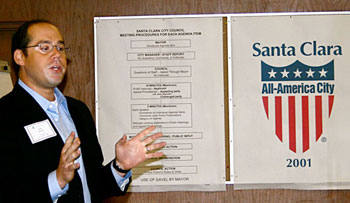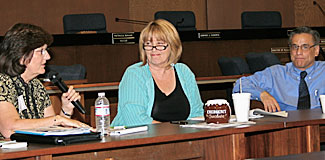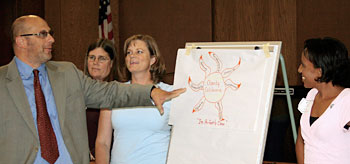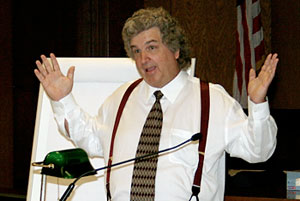
California Ethics and Democracy Summit I

California Ethics Project Launches Ground-breaking Good Government Effort
First California Ethics Summit Hosts 47 City Clerks in Santa Clara
Santa Clara, CA, July 30, 2009: On July 30th, 2009, the California Ethics Project hosted the inaugural meeting of California City Clerks regarding their role in encouraging ethics, good government, and voter engagement programs. Participants in the first “California Ethics Summit” included forty-seven city clerks from throughout the state.

California Ethics Project Chair Rod Diridon, Jr., MMC
“Transparency and engaged voters are the best way to proactively foster government at its best,” said Rod Diridon, Jr., the Chair of the California Ethics Project and City Clerk for the City of Santa Clara. “Empowered voters will foster our elected officials to perform at a higher level, raising the caliber of debate and public service.”
The California Ethics Summit provided a venue for sharing resources and taught the skills necessary to implement ethics, good government, and voter outreach projects.
“The conversation was frank and engaging and the information truly enlightening,” said Colleen Nicol, the City Clerk of Riverside and incoming president of the International Institute of City Clerks. “Participants left with practical application tools in hand which are perfect for immediate implementation in our communities,” she added.
One unique element of the summit was the collaboration between city clerks and professional political consultants. City clerks (who also serve as elections officers) have an impartial role in election preparation and execution while political consultants are inherently focused on electing their clients.

City Clerk Marcia Torgerson, Deputy City Manager Carol McCarthy, Dr. Tom Shanks
“The California Ethics Summit was a fantastic opportunity for city clerks to learn the behind the scene workings of political campaigning,” said Maureen Kane, the Executive Director of the California Institute. “This will be valuable information as they educate and advocate for ethical campaigns in the municipal election process.”
Normally on the opposite sides of the counter, this lifting of the veil shared real strategies surrounding the creation and implementation of “foundation elements” in codes of ethics and campaign finance reform, as well as “enforcement elements” in ethics commissions and community/voter outreach programs.

Leo Briones, President of Centaur North Strategic Communications
“In many ways, the city clerk is the hero of democracy,” said Leo Briones, President of Centaur Communication and a respected political consultant. “Their role in elections from small rural villages to megalopolis’ is the firewall between good government and failed democracy.”
The curriculum was a first for city clerks, including nine speakers, four sessions, two panels, and two group exercises. With the help of industry professionals and respected political consultants, city clerks enjoyed sessions entitled “Why and What,” “An Insider’s View on Political Campaigns,” “Messaging and Mediums” and “Managing the Logistics and What Could Go Wrong.”
However, it was clear through the session that the city clerks did not want to influence the outcome of elections or squelch freedom of speech. “Positive information isn’t always the truth and the truth isn’t always positive,” said Rich Robinson, the President of Robinson Communications. “What is essential for the voter in elections is that they be able to distinguish fact from fiction and make informed choices.”

Rich Robinson, President of Robinson Communication
The California Ethics Project has already engaged 17 “Pioneer Cities” throughout the state. These Pioneer Cities will develop implementation strategies and content for programs tailored to the character and budgetary constraints of their unique communities.
The California Ethics Project works in partnership with local communities, City Councils, City Managers, and the City Clerks Association of California to explore the Clerk’s role in fostering codes of values and ethics, campaign finance reform, community and voter outreach efforts, and other good government programs. The unbiased nature of the City Clerk/Elections Official is unique and provides a license to implement good government programs in a manner that is beyond reproach. Through this, the project will provide the tools for California’s voters to more effectively vet candidates, raise the caliber of debate and be increasingly engaged in the process of democracy.
